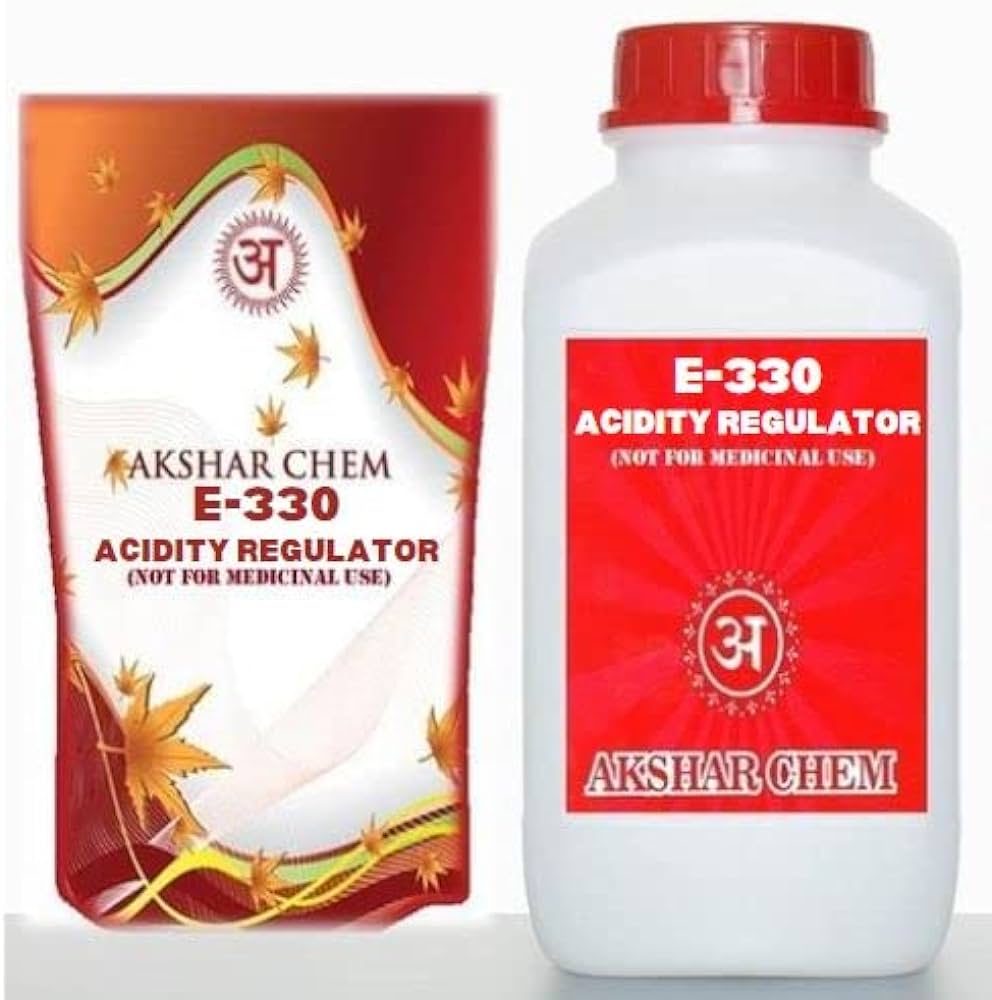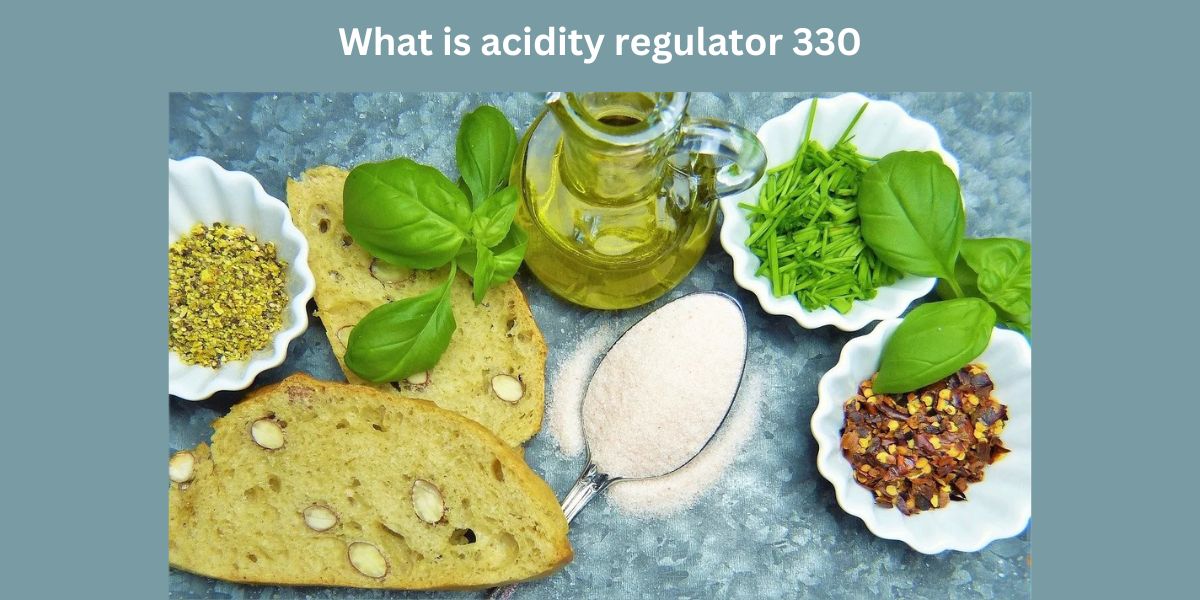Acidity regulators, commonly known as pH control agents, are a vital food additive. Among them is INS 330, also known as citric acid. This is used extensively in food due to its fantastic acidity-controlling and food-quality-improving properties. It is an organic compound naturally found in citrus fruits, such as lemons and limes. Citric acid is incorporated in food products primarily for stability, flavour, and shelf life.
INS 330 is not limited to the food industry. It is a versatile chemical compound used in pharmaceuticals, cosmetics, and cleaning products because it is non-toxic and environmentally friendly. Its vast applications make it a significant factor in consumer satisfaction and product longevity. This blog discusses the benefits of INS 330, possible side effects, how to use it, and who should include it in their diets. With this compound, you can make informed choices about the products you consume.
Advantages of Acidity Regulator (INS 330)

- Improves Shelf Life: INS 330 inhibits the growth of pathogenic and harmful microorganisms. Its regulatory power on pH makes food products fresh and safe for a longer period of time while helping reduce spoilage and waste.
- Supports Nutritional Stability: INS 330 supports nutritional stability by preserving the potency of certain vitamins, especially vitamin C in foods. This stabilizing effect ensures that the consumers receive the maximum nutritional benefits from fortified foods and beverages.
- Facilitates pH Regulation: Maintaining an optimal pH will support the right acidity levels in food and beverages so that the products have the right texture, taste, and chemical stability.
- Texture Improvement: Citric acid in some processed foods helps retain desirable textures such as the creaminess of dairy or the smoothness of processed cheese. It also inhibits crystallization in confections.
- Eco-Friendly and Natural: Citric acid, derived from natural sources or fermentation, is a more environmentally friendly additive. Its natural origin aligns with the consumer demand for cleaner labels and more sustainable ingredients.
- Improves Product Safety: It improves product safety by retarding the development of harmful pathogenic and bacterial growth, hence limiting foodborne ailments, especially for ready-to-eat and preserved foods.
- Mostly recognized as safe: By all the FDA and EFSA organizations, INS 330 is considered safe for consumption, especially within bound limits. Thus, this gives peace of mind to both manufacturers and consumers.
- Versatile in Applications: Besides the food industry, INS 330 is applied in cosmetics, pharmaceuticals, and cleaning products. This reflects the high versatility and significance of INS 330 in numerous daily applications.
- Economical and Efficient: INS 330 represents an economical method for preserving food and adjusting pH. Consequently, manufacturers worldwide opt for it without compromising quality and efficacy.
- Improves the Flavor Profile: Citric acid balances and enhances the flavours of food and beverages with a tangy or slightly sour note. It finds large applications in carbonated drinks, candies, and sauces.
Side Effects of Using Acidity Regulator (INS 330)

- Causes Erosion of Tooth Enamel: Frequent consumption of products with INS 330 tends to erode the enamel of the teeth, increasing the susceptibility of such teeth to cavities and sensitivity if proper oral hygiene is not observed.
- Can Cause Stomach Discomfort: In some people, excessive consumption of INS 330 can cause stomach discomfort, such as bloating, acid reflux, or slight nausea, especially for sensitive stomachs.
- Possibility of Allergic Reaction: While it is extremely rare, some people can be allergic to citric acid, leading to reactions like skin irritation, rashes, or breathing problems in severe cases.
- May Worsen Pre-Existing Conditions: Those who have acid-related conditions such as GERD or ulcers may have products with INS 330 worsen their symptoms and cause them to experience more heartburn or discomfort.
- Chances of Over-consumption: Since INS 330 is found in most processed foods, high consumption can be done accidentally and might lead to several long-term effects such as depletion of calcium or metabolic imbalances.
- Chances of drug interaction: Citric acid can interact with drugs like antacids or antibiotics, affecting its working. It is a good idea to consult a health professional if one is on regular medications.
- Effect on Kidney Health: It has been known that excessive levels of citric acid can hurt those with existing kidney problems since it may stress the kidneys or contribute to the development of kidney stones.
- Can Irritate Open Wounds: When not diluted, direct contact with INS 330 with skin areas can irritate cuts, abrasions, or sensitive skin. Thus, great care must be taken when using the product.
- Not Appropriate for All Age Groups: Children or the aged with more sensitive health conditions may be adversely affected by too much intake of INS 330, so their intake needs to be well-controlled and monitored.
- Environmental and Ethical Issues: Citric acid production through industrial fermentation is generally environmentally friendly though it raises issues concerning waste management, which are factors against sustainability.
How to Use the Acidity Regulator (INS 330)?
Acidity regulator INS 330, commonly known as citric acid, is highly versatile and has applications in foods, beverages, and the home. Its performance is, however, greatly determined by the right use of this ingredient to create the balance desired for that effect.
In food preparation, INS 330 is added to recipes to make food flavorful and fresh. For example, a small amount can be sprinkled on fruits to prevent browning or mixed with water to preserve their natural appearance and taste. Similarly, it can be used in soups, sauces, or marinades to lend a tangy zest to the dish, amplifying the overall flavour profile.
INS 330 plays a vital role in the beverage industry in maintaining the pH of drinks while enhancing their taste. It is widely used in carbonated drinks, lemonades, and energy drinks to provide a tartness that balances sweetness and complements other flavouring agents. A minimal amount of citric acid for homemade drinks stabilizes the pH. It improves the drink’s shelf life, making it a valuable addition for both personal and commercial uses.
INS 330 is also used in baking and confectionery where it improves dough elasticity and acts as a souring agent in candies and gummies. Bakers condition dough, improve texture and control acidity in yeast-leavened products, which results in consistent results. It also prevents crystallization in syrups and confections, resulting in a smooth and uniform texture.
Outside the kitchen, citric acid is used in many places as a natural cleaning agent because it breaks down mineral deposits. It can be added to water to clean surfaces, descale appliances, or remove stains. Industrially, it acts as a pH adjuster and stabilizer in cosmetics, pharmaceuticals, and processed foods.
When using INS 330, measuring quantities accurately and by the recommended guidelines is important. Otherwise, it may overpower flavour or cause unintended side effects. Food-grade citric acid should be used when edible applications are involved. It should be stored in a dry, airtight container to preserve potency.
To Whom Can Consume the Acidity Regulator (INS 330)
Acidity regulator INS 330, or citric acid, is a food additive used by many people as it is naturally sourced and is generally considered safe. However, its consumption is more useful for specific groups based on their dietary habits, health needs, and lifestyle preferences.
Some of the major consumers of INS 330 are those who consume processed foods or beverages daily. Since it is generally present in soft drinks, candies, jams, and canned products, consumers looking for improved flavour and longer shelf life appreciate its presence. Healthy consumers also like that it can stabilize and preserve nutrients, particularly vitamin C, making such fortified foods a good way to maintain a healthy diet.
Fitness enthusiasts and athletes are another group that indirectly consumes citric acid through sports drinks and energy supplements. INS 330 maintains the product’s pH and gives these drinks a refreshing tartness, making them more enjoyable and hydrating during periods of intense physical activity. Similarly, people following plant-based or vegan diets will consume citric acid in dairy-free cheeses, plant-based milk, and other vegan products where it provides texture and preservation.
INS 330 can also be a useful additive for home cooks or food preservation enthusiasts. It is commonly added to pickle, jam, and syrup recipes to balance the acidity and prevent spoilage. For those on specific diets, such as low-sodium diets, citric acid can add flavour without salt.
However, not everyone can consume citric acid freely. Those who have health issues associated with acidity, such as GERD or ulcers, should limit their intake because it will worsen the symptoms. Furthermore, though citric acid is generally safe for children and older people, its consumption should be limited in these groups of people because their health conditions are more sensitive.
Ultimately, INS 330 is versatile and safe for most people when consumed within recommended limits, making it an indispensable ingredient in modern food science and culinary practice.
Conclusion
Acidity regulator INS 330, or citric acid, is a multifaceted and valuable ingredient widely used in the food, beverage, and industrial sectors. It enhances flavour, preserves freshness, enhances product safety, and helps maintain nutritional stability. It is generally safe for most people but should be consumed in moderation to avoid side effects, especially for people with certain health conditions. Whether used in cooking, baking, or cleaning, INS 330 offers practical and efficient solutions. Understanding its applications and limitations will help consumers and manufacturers harness its full potential for convenience and quality.
FAQs About Acidity Regulator (INS 330)
1. What is INS 330?
INS 330, or citric acid, is a natural acidity regulator obtained from citrus fruits or fermentation. This is used widely in food and beverages for flavour enhancement, preservation, and pH stabilization.
2. Is INS 330 safe for consumption?
Yes, INS 330 is generally recognized as safe by the FDA and EFSA. When taken within approved limits, it does not pose serious health risks for most people, including children and the elderly.
3. Can people suffering from acid reflux take INS 330?
Individuals with acid reflux or GERD should avoid consuming large amounts of INS 330 since its nature is acidic and may contribute to heartburn or discomfort. However, one must consult a doctor or dietician before making any such change.
4. How does citric acid work in cleaning?
Citric acid removes limescale, stains, and mineral deposits. It can be mixed with water to create a natural, eco-friendly cleaning solution for kettles, coffee makers, bathroom fixtures, and other household surfaces.
5. What foods commonly contain INS 330?
INS 330 is present in many foods, such as soft drinks, candies, jams, jellies, canned fruits, processed cheeses, and baked goods. It improves flavour, prevents spoilage, and ensures acidity in these products.











Add Comment